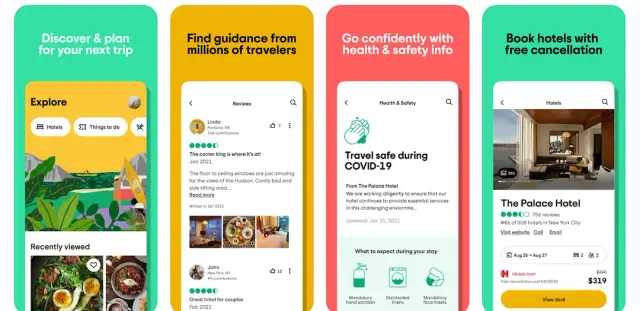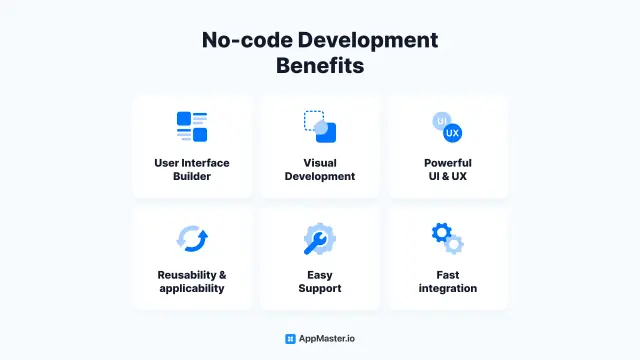How to Make a Travel Planning App like Tripadvisor?
Unlock the secrets of creating a travel planning app like Tripadvisor with this comprehensive guide, including insights into key features, development processes, and how to monetize your platform.

The global tourism industry has experienced significant growth in recent years, and as a result, travel planning apps have become immensely popular. Platforms like Tripadvisor, Booking.com, Airbnb, and more have fundamentally changed the way people plan, book, and share their travel experiences.
Travel planning apps help users find flights, accommodations, restaurants, and local attractions, along with reviews, recommendations, and itinerary management features. They create a seamless experience for travelers, making it significantly easier to research and plan trips.
The ongoing surge in smartphone usage and internet accessibility have expanded the market for travel planning apps, creating a more extensive user base that demands reliable, high-quality, and feature-rich applications. With this growing demand, new opportunities arise for entrepreneurs interested in the travel and tourism industry.
Understanding Tripadvisor's Key Features
Tripadvisor is a widely recognized travel planning platform known for its extensive database of user-generated reviews, information about accommodations, flights, and various activities in a given destination. To create a travel planning app similar to Tripadvisor, it is crucial to understand its key features and the value they bring to users.

- Search Functionality: Users can search for flights, accommodations, restaurants, and attractions across a wide range of destinations. Accurate search results and comprehensive filtering options are essential for a positive user experience.
- User-Generated Reviews and Ratings: Tripadvisor's core value proposition revolves around user-generated reviews, which allows travelers to make informed decisions based on shared experiences. Integrating a system that encourages users to leave reviews and rate various points of interest is vital for building trust and credibility.
- Booking Capabilities: Allowing users to book flights, accommodations, and activities within the app increases convenience and keeps users engaged throughout the planning process.
- Map Integration: Integrating maps from providers like Google Maps ensures users can visualize their trip and find necessary information such as distances, nearby attractions, and routes quickly.
- In-App Messaging: Providing an in-app messaging system enables users to communicate with travel providers, ask questions, and discuss custom services or arrangements.
- Social Media Integration: Integration with popular social media platforms enables users to share their experiences, invite friends to collaborate on trip planning, and discover new destinations through their connections.
Understanding these essential features is the first step in creating a successful travel planning app. However, merely replicating these features isn't enough; you must tailor them to your target audience and ensure that they offer a unique value proposition.
Competitor Analysis and Unique Value Proposition
Before developing your travel planning app, it is crucial to research the competitive and identify the strengths and weaknesses of existing platforms. By understanding popular apps' differentiating factors and the market gaps they leave unaddressed, you can define a unique value proposition for your app that sets it apart from the competition.
Start by analyzing the features, target audience, revenue models, and user engagement strategies of competing apps. Pay particular attention to user feedback and reviews, as they can shed light on areas that need improvement.
When defining your unique value proposition, consider the type of travelers you want to attract, the problems they face when planning trips, and how you can provide innovative solutions. You may decide to focus on a specific travel niche, offer unique features or experience sharing aspects, or deliver a more personalized and seamless booking process.
A successful unique value proposition is highly essential for capturing users' attention and encouraging them to choose your app over competitors. Be sure to communicate your product's unique benefits in a clear and straightforward manner through your app's design, messaging, and marketing efforts.
Creating a travel planning app like Tripadvisor requires an in-depth understanding of the platform's core features and a thorough competitor analysis to determine unaddressed market gaps. By defining a unique value proposition and tailoring your app to meet travelers' specific needs, you can pave the way for a successful entry into the highly competitive travel planning app market.
Creating a Monetization Strategy
A well-thought-out monetization strategy is essential for any app, particularly in the competitive travel planning space. It helps ensure that you can generate revenue while providing users with a valuable and enjoyable experience. Here are some effective monetization strategies to consider for your travel planning app:
- Commission-based partnerships: Collaborate with hotels, airlines, and tour providers to earn commissions from every booking made through your app. Research potential partners and negotiate commission rates that work for both parties. It is essential to develop relationships with various providers to offer users a wide range of options.
- Display advertising: Incorporate display ads into your app as an additional revenue stream. Partner with advertising networks to fill ad inventories, or collaborate with travel-related companies to promote their products and services. Be mindful of ad placement and frequency, as excessive ads can negatively impact user experience.
- Promoted listings: Allow businesses to pay for premium placement in search results or listings, ensuring higher visibility for their offerings. Create a tiered system for promoted listings, with different levels of promotion correlating to higher pricing.
- In-app purchases: Offer extra features or services as in-app purchases, such as an ad-free experience, offline access to content, or premium user support. This approach allows users to choose whether they want to enhance their experience by paying for these additional perks.
- Subscription model: Implement a subscription-based model with premium features available only to paid subscribers. These premium features could include advanced search filters, exclusive discounts, or members-only content. Ensure that the core functionality remains accessible to all users, even those who don't subscribe.
Combining multiple monetization methods can create a diverse revenue stream and increase your app's value to users. Be cautious not to overwhelm users with invasive monetization tactics that could detract from the overall user experience.
App Design and UX Principles
Great design and user experience (UX) are indispensable components of any successful app. A well-designed, user-friendly interface can encourage users to stay engaged with your travel planning app and become loyal, long-term customers. Consider the following principles when designing your app:
- Intuitive and straightforward layout: Make sure your app's layout is easy to navigate and understand. Users should access key functionalities quickly, without having to dig through multiple layers of menus. Implement consistent design elements and familiar icons to facilitate smooth navigation.
- Visually pleasing design: Your app's visual design should be aesthetically appealing, with a coherent color scheme, typography, and imagery. Choose a design that aligns with your brand and target audience while maintaining simplicity and clarity.
- Personalization and customization: Provide your users the option to customize their app experience, such as choosing their preferred language, currency, or setting up travel preferences. This personal touch can increase user satisfaction and engagement with your app.
- Fast loading times and responsiveness: Your app should load quickly and respond swiftly to user inputs. Slow-loading screens or a laggy interface can frustrate users and lead to negative reviews or app abandonment.
- Optimized for various screen sizes and devices: Design your app to function and display content effectively across various screen sizes, resolutions, and devices, including both Android and iOS platforms. This cross-platform compatibility ensures that users can enjoy your app on their preferred device.
- Accessibility: Prioritize accessibility in your app design by implementing features such as larger text sizes, high-contrast color schemes, and voice-activated search functions. This inclusivity can broaden your app's potential user base and resonate with a wider audience.
Designing your app with these UX principles in mind can lead to higher user satisfaction, return visits, and positive word-of-mouth marketing. Additionally, monitoring user feedback and continually iterating on your design can help optimize the overall user experience.
Technical Stack and Development Process
Selecting the right technical stack for your travel planning app is a critical decision in the development process. A well-planned architecture provides a stable foundation for your app, ensures smooth functionality, and allows for future scaling. Here are some recommendations for choosing the appropriate technologies:
- Mobile app development frameworks: Choose a cross-platform framework like React Native or Flutter to streamline development and ensure compatibility with both Android and iOS. These frameworks enable your app to reach a wider audience while reducing development time and resources.
- Backend development: A reliable backend is essential to support your app's infrastructure, handle complex business logic, and enable API integrations. Node.js, Ruby on Rails, or Django are popular backend frameworks that can provide a strong foundation for your app.
- Database management: Your travel planning app will include vast amounts of data from various sources, such as accommodations, flights, user reviews, and bookings. Opt for a reliable database management system, like PostgreSQL or MongoDB, to efficiently handle this data.
- API integration: Integrating third-party APIs is crucial to access the necessary data and services for your app. Build connections with global distribution systems (GDSs) like Amadeus, flight and hotel booking providers like Expedia, local services providers, and mapping services like Google Maps.
- AppMaster platform: Consider using a no-code platform like AppMaster for rapid development, cost efficiency, and scalability. AppMaster allows you to build web apps, mobile apps, and backend services with a visual interface, significantly speeding up the development process.

After selecting your technical stack, you can proceed with the development process, which generally includes:
- Planning: Define your app's objectives, features, and target audience. Create a project roadmap and allocate necessary resources.
- UI/UX design: Design your app's interface based on user experience principles, create wireframes and mockups, and finalize design assets.
- Development: Build your app using your chosen tech stack, following best coding practices and adhering to your project architecture.
- Testing: Conduct thorough testing, both manually and with automated tools, to identify and fix any bugs or issues. Ensure that your app performs well across various devices, screen sizes, and platforms.
- Deployment: Release your app on major app stores such as Google Play and the App Store. Configure backend services, databases, and APIs as required.
- Maintenance and updates: Monitor user feedback and analytics, address reported issues, and release regular updates to enhance your app's functionality and user experience.
By carefully planning your technical stack and following a structured development process, you can create a powerful, efficient, and scalable travel planning app that delivers an exceptional experience to your users.
Integrating Third-Party Services and APIs
Developing a travel planning app like Tripadvisor requires the integration of numerous third-party services and APIs to access data resources such as flights, hotels, activities, and more. By incorporating these APIs, you can provide your users with comprehensive information that can help them plan their trips seamlessly. Here are some key third-party services and APIs to consider integrating into your travel platform:
Global Distribution Systems (GDSs)
Global Distribution Systems such as Amadeus, Sabre, and Travelport aggregates and distributes travel-related data such as flights, hotels, and car rentals. Integrating GDS APIs in your app allows users to access accurate and up-to-date information across a wide range of travel service providers.
Flight and Hotel Booking Providers
Connect your app with flight and hotel booking providers such as Expedia, Booking.com, and Skyscanner. These services offer APIs that provide users with the ability to search and book travel accommodations and flights directly through your app.
Local Services and Activities
Incorporate APIs from services like Viator or GetYourGuide to provide users with access to local tours, activities, and attractions. This integration allows users to discover and book unique experiences as part of their travel itinerary.
Mapping Services
Integrate mapping APIs like Google Maps, Mapbox, or HERE to help users navigate during their trips, find points of interest, and plan their routes efficiently.
Payment Gateways
Secure and reliable payment processing is crucial for a travel planning app. Consider integrating trusted payment gateways such as Stripe or Braintree for processing transactions and offering a seamless checkout experience.
Social Media Integration
Encourage users to share their travel experiences and engage with your app by integrating with popular social media platforms like Facebook, Instagram, and Twitter. These integrations aid in user authentication, sharing content, and amplifying your app's reach.
Launching, Marketing, and User Acquisition
Once your travel planning app is developed and integrated with the necessary third-party services, it's time to launch, market, and attract users to your platform. Consider the following strategies to maximize user acquisition and generate interest:
Unique Value Proposition (UVP)
Identify and communicate your app's unique value proposition (UVP) to differentiate it from competitors like Tripadvisor. Focus on your target audience, understand their needs, and tailor your app's features and benefits to their preferences.
App Store Optimization (ASO)
Improve your app's visibility in the Apple App Store or Google Play Store through App Store Optimization. Optimize your app's title, description, and keywords to target relevant search queries and enhance its rankings in search results.
Marketing Campaigns
Invest in various marketing channels such as search engine marketing (SEM), email marketing, and social media marketing to reach your target audience, raise brand awareness, and drive app downloads.
Influencer Marketing
Partner with influencers in the travel industry to reach a wider audience, gain credibility, and generate user interest. Identify influencers whose values and niche align with your app's focus and collaborate on content creation, sponsored posts, or co-branded campaigns.
Promotional Incentives
Offer promotional incentives like first-time user discounts, referral bonuses, or limited-time deals to motivate potential users to download and use your app during the launch phase.
Scaling and Maintaining Your Travel Planning App
As your travel planning app grows and gains traction in the market, it's essential to adapt, scale, and maintain the platform for continued success. Consider the following tactics to ensure your app stays relevant and valuable to its users:
Continuous Improvement
Constantly iterate and improve your app's features and user experience based on feedback, user needs, and market trends. Regular updates ensure that your app remains competitive and caters to the evolving demands of the travel industry.
Scalability
As your user base expands, your app's infrastructure must be prepared to handle increased data volume and usage. Employ a scalable server architecture and consider using cloud-based services like AWS, Google Cloud, or Microsoft Azure to efficiently manage your app's resources and growth.
Security and Data Protection
Privacy and data security are crucial in the travel industry, as users share sensitive information like contact details, travel plans, and payment details. Implement robust security measures, such as secure APIs, encrypted data storage, and regular security audits, to protect user data and maintain user trust.
App Monitoring and Analytics
Track and analyze your app's performance, user behavior, and engagement through monitoring and analytics tools like Google Analytics and Firebase. This insight helps you identify areas for improvement, troubleshoot issues, and prioritize updates that benefit your users most.
Creating a successful travel planning app like Tripadvisor takes time, effort, and the integration of various third-party services. By focusing on user acquisition, unique features, and ongoing maintenance, your app can grow and succeed in the competitive travel industry. Consider using platforms like AppMaster to fast-track your app's development process, save resources, and deliver a feature-rich platform to your users seamlessly.
FAQ
Essential features include search functionality, user-generated reviews, booking capabilities for accommodations, flights, and activities, map integration, in-app messaging, and social media integration.
Travel planning apps can monetize through commission-based partnerships with hotels, airlines, and tour providers, display advertising, promoted listings, and in-app purchases for additional features.
Considering both frontend and backend development needs, a combination of technologies like React Native or Flutter for mobile app development, Node.js or Ruby on Rails for backend, and APIs for data integration is recommended.
Integrate APIs for global distribution systems (GDSs) such as Amadeus, flight and hotel booking providers like Expedia, local services and activity providers, and mapping services like Google Maps.
Successful user acquisition strategies include providing a unique value proposition, offering an excellent user experience, ongoing marketing campaigns, leveraging social media and influencer marketing, offering promotional incentives, and app store optimization (ASO).
Regular updates, addressing user feedback, maintaining active marketing campaigns, and constantly evolving the app by adding new features and improving user experience are essential for ongoing success.
Design and UX principles help create an intuitive and user-friendly app experience, making it easy for users to navigate and accomplish their goals effectively, ultimately leading to higher user satisfaction and retention.
While many travel planning apps offer similar features, the differences lie in their specific focus, target audience, design aspects, and unique features offered. A competitive analysis is essential to identify gaps in the market and create a unique value proposition.





